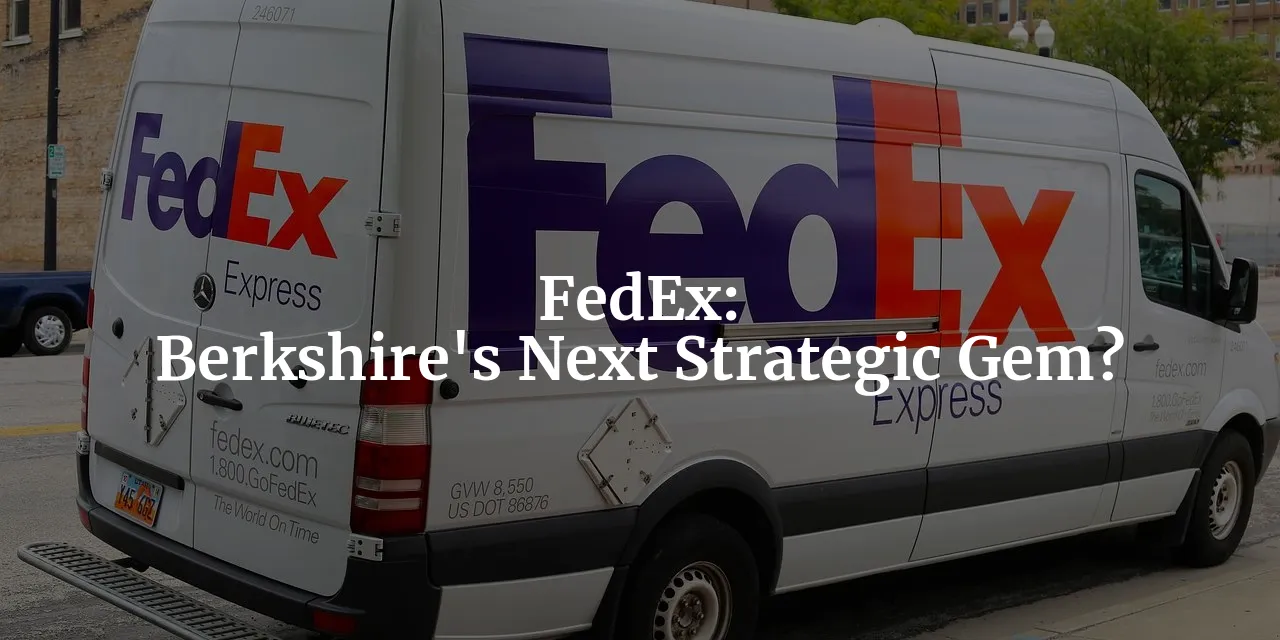Tags: Comments
This fanpage is not officially affiliated with Berkshire Hathaway: Disclaimer
We've conducted several thought experiments on Berkshire Hathaway's potential next investment targets, considering options like The Hartford ↗, farmland ↗, or even investments in Brazil ↗. However, let's return to the fundamentals and focus on a basic sector: logistics. Imagine the transformative potential of acquiring FedEx—a strategic move designed to capitalize on the booming e-commerce landscape. With a market cap of approximately $65 billion and a price-to-earnings ratio of around 16 7, this could be a viable opportunity. Let's delve deeper into this possibility!

Introduction
As shareholders of Berkshire Hathaway, we are no strangers to the company's history of strategic acquisitions that have consistently delivered value. With Warren Buffett at the helm, Berkshire has a knack for identifying and acquiring businesses that not only complement its existing portfolio but also promise stable cash flows and long-term growth. This article speculates on the tantalizing possibility of FedEx becoming the next strategic gem in Berkshire Hathaway's crown.
Over the years, Berkshire Hathaway has made several high-profile acquisitions that have significantly bolstered its portfolio. Notable among these are the acquisitions of BNSF Railway in 2010 and Geico in 1996. These companies have not only provided stable returns but have also synergized well with Berkshire's other holdings, creating a robust and diversified conglomerate.
The current economic climate is ripe for strategic acquisitions, especially in the logistics sector. The e-commerce industry is booming, driving unprecedented demand for logistics and transportation services. This surge is reflected in the US Freight and Logistics Market, which is projected to grow from 1.33 trillion USD in 2024 to 1.67 trillion USD by 2030 9.
Adding to the intrigue is Berkshire Hathaway’s record cash reserves, which reached an astounding $277 billion in Q2 2024 ↗1. This massive cash pile, bolstered by recent sales of stakes in Apple 3 and Bank of America 2 ↗, positions Berkshire perfectly for a significant acquisition. The recent divestitures suggest that Berkshire is actively seeking new investment opportunities. This strategic repositioning aligns with Buffett’s philosophy of investing in companies with stable cash flows and low-risk, high-return potential.
Warren Buffett has always been vocal about his preference for businesses that offer predictable earnings and minimal risk. His statement, "We'd love to spend it, but we won't spend it unless we think [a business is] doing something that has very little risk and can make us a lot of money," 1 underscores this approach.
This article aims to explore the strategic rationale behind a potential acquisition of FedEx by Berkshire Hathaway ↗. By analyzing the synergies, market position, and growth potential of FedEx, we will delve into why this acquisition could be a masterstroke for Berkshire.
So, could FedEx be the next jewel in Berkshire Hathaway’s crown? Let’s explore this fascinating possibility.
Strategic Move: Acquiring a Major Logistics Company
The continued growth of e-commerce is a significant driver of demand in the logistics sector. With the US Freight and Logistics Market estimated to grow to 1.67 trillion USD by 20309, the logistics industry is poised for substantial expansion. This boom presents a lucrative opportunity for Berkshire Hathaway to capitalize on by acquiring a major player like FedEx.
Acquiring FedEx would create powerful synergies with Berkshire’s existing transportation assets, particularly BNSF Railway. BNSF, a dominant player in the freight rail industry, could seamlessly integrate with FedEx’s extensive logistics network, enhancing operational efficiency and expanding service offerings ↗. This integration could lead to optimized transportation routes, reduced costs, and improved delivery times, benefiting both companies.
One of the key attractions of the logistics sector is its predictable and stable cash flows. FedEx, with its diversified revenue streams and global reach, aligns perfectly with Buffett’s investment criteria. The company’s consistent performance and ability to generate reliable cash flows make it an ideal candidate for Berkshire’s portfolio.
FedEx holds a strong market position, serving over 220 countries and territories 8. Its extensive global network, coupled with a well-established brand, provides a competitive edge in the logistics industry. This robust market presence would add significant value to Berkshire’s portfolio, enhancing its global footprint.
FedEx’s emphasis on technology, automation, and data analytics for operational efficiency is another compelling reason for Berkshire to consider this acquisition. The company’s technological advancements in areas like real-time tracking and delivery optimization not only improve customer satisfaction but also drive cost efficiencies 8. This focus on innovation aligns well with Berkshire’s long-term investment strategy.
In the competitive landscape, FedEx stands out for its comprehensive service offerings and global reach. While competitors like UPS and DHL also have strong market positions, FedEx’s diversified revenue streams and technological leadership provide a distinct advantage 8. By acquiring FedEx, Berkshire could leverage these strengths to further solidify its position in the logistics sector.
The logistics industry offers numerous growth opportunities, particularly in emerging markets and sustainable initiatives. FedEx’s strategic focus on expanding its services in these areas presents a significant upside potential. Additionally, the company’s commitment to sustainability and reducing its carbon footprint aligns with the growing emphasis on environmental responsibility, making it an attractive investment.
The acquisition of FedEx by Berkshire Hathaway could be a strategic masterstroke, capitalizing on the e-commerce boom, creating synergies with existing businesses, and leveraging FedEx’s strong market position and technological leadership. As we delve deeper into the rationale behind this potential acquisition, the case for FedEx as Berkshire’s next strategic gem becomes increasingly compelling.
Rationale: Why FedEx?
When contemplating potential acquisitions, FedEx stands out as a compelling candidate for Berkshire Hathaway. Here’s why:
FedEx boasts an extensive global network that is unparalleled in the logistics industry. The company operates a sophisticated hub-and-spoke system with a central hub at Memphis International Airport and 40 regional hubs worldwide. This infrastructure allows FedEx to serve over 220 countries and territories, ensuring efficient and reliable delivery services on a global scale 8. Such a network would complement Berkshire’s existing transportation assets, particularly BNSF Railway, creating synergies that could enhance operational efficiency and market reach; we will talk about this later.
FedEx has consistently demonstrated its ability to innovate within the logistics sector. Services like FedEx Ground and FedEx SmartPost have revolutionized package delivery, catering to the growing demands of e-commerce and providing cost-effective, time-definite delivery solutions 8. These innovative logistics solutions align well with Berkshire’s ethos of investing in companies that exhibit operational excellence and forward-thinking strategies.
Financially, FedEx is robust. In 2024, the company reported a revenue of around $88 billion and total assets amounting to $87 billion 5. Despite facing some challenges, including a recent dip in share price and a revision in earnings guidance, FedEx remains a financially sound entity with significant market presence. Its current market cap stands at $64.5 billion, with a 52-week share price range of $224.69 to $313.84 7. This financial stability makes FedEx a viable acquisition target that can contribute positively to Berkshire’s portfolio.
FedEx’s market valuation, combined with its strategic assets, presents a unique opportunity for Berkshire. The company’s current share price of around $264 reflects a market that may be undervaluing its long-term potential, especially given its extensive infrastructure and innovative capabilities 7. Acquiring FedEx at this juncture could provide Berkshire with a valuable asset at a relatively attractive price, aligning with Warren Buffett’s strategy of purchasing high-quality businesses at fair valuations.
FedEx’s business model aligns seamlessly with Berkshire’s existing portfolio, particularly in the transportation and logistics sectors. Berkshire’s ownership of BNSF Railway has already demonstrated the conglomerate’s ability to manage and grow large-scale transportation assets 4. Integrating FedEx into this framework could unlock new efficiencies and growth opportunities, leveraging both companies’ strengths to dominate the logistics landscape.
Under the leadership of CEO Rajesh Subramaniam, FedEx has shown a strategic focus on improving industrial economy conditions and navigating through challenging market environments 6. This forward-looking vision aligns with Berkshire’s investment philosophy, which values strong leadership and a clear strategic direction. Subramaniam’s cautious optimism about the future and commitment to operational excellence make FedEx a promising candidate for Berkshire’s next strategic acquisition.
FedEx serves a diverse customer base, ranging from individual consumers to large enterprises and e-commerce retailers 8. This wide-ranging clientele ensures a steady revenue stream and positions FedEx as a critical player in the global supply chain. For Berkshire, acquiring a company with such a diversified customer base would mitigate risks and enhance revenue stability, further solidifying its market position.
Leveraging Cash Reserves
Berkshire Hathaway’s substantial cash reserves are a testament to its financial strength and prudent management. As of Q2 2024, Berkshire’s cash pile reached a record $276.9 billion, up from the previous record of $189 billion 1. This immense liquidity provides Berkshire with the flexibility to finance large acquisitions without resorting to excessive debt, maintaining its robust balance sheet.
Berkshire has a history of leveraging its cash reserves for strategic acquisitions. A notable example is the purchase of BNSF Railway in 2010, which has since become a cornerstone of Berkshire’s portfolio 4. This precedent underscores Berkshire’s capability to integrate and grow large-scale transportation assets, making the potential acquisition of FedEx a logical next step.
Timing is crucial in acquisitions, and current market conditions present an opportune moment for Berkshire to consider acquiring FedEx. With FedEx’s shares experiencing a dip due to revised earnings guidance and market volatility 6, Berkshire could capitalize on this temporary weakness to secure a valuable asset at a favorable price. This strategic timing aligns with Warren Buffett’s philosophy of buying quality businesses during market downturns.
Warren Buffett’s cautious approach to risk is well-documented. He has consistently emphasized that any acquisition must align with his philosophy of low-risk, high-return investments. FedEx, with its strong brand recognition, extensive infrastructure, and diversified revenue streams, fits this criterion. By leveraging its cash reserves, Berkshire can acquire FedEx without compromising its financial stability, ensuring a prudent and strategic investment.
Berkshire has several financing strategies at its disposal. It could utilize its cash reserves entirely, issue new shares, or employ a combination of both. Given the substantial cash pile, a cash transaction would be feasible and would avoid diluting existing shareholders’ equity. Alternatively, a mixed approach could balance liquidity management while maintaining financial flexibility.
A hypothetical cost-benefit analysis of acquiring FedEx reveals significant potential synergies and cost savings. Integrating FedEx with Berkshire’s existing logistics assets, such as BNSF Railway, could streamline operations, reduce overhead costs, and enhance service offerings. The potential for cross-selling services and optimizing supply chain efficiencies further strengthens the case for acquisition.
For Berkshire Hathaway’s shareholders, the acquisition of FedEx could enhance long-term value by diversifying the conglomerate’s revenue streams and reinforcing its market position in the logistics sector. The strategic fit, combined with potential operational synergies, positions Berkshire to capitalize on growth opportunities and deliver sustained shareholder returns.
Integration with Existing Assets
One of the most intriguing points of acquiring FedEx would be possible interactions with other subsidiaries. Let us review the key benefits.
Operational Synergies: Integrating FedEx with Berkshire Hathaway's existing transportation assets, such as BNSF Railway ↗, could create substantial operational efficiencies. BNSF Railway, a key component of Berkshire's portfolio since its acquisition in 2010, boasts an extensive network of over 33,400 miles of track across the Western, Midwestern, and Southern United States 4. By combining FedEx's hub-and-spoke system with BNSF's transcontinental routes, the potential for streamlined logistics operations becomes apparent. This integration could lead to more efficient cargo transfers, reduced transit times, and optimized route planning, ultimately enhancing the overall supply chain. In a similar fashion, FedEx couriers could potentially benefit from leveraging Pilot Travel Centers' existing infrastructure. Given that Pilot Travel Centers are strategically located across major highways and serve as vital rest and refueling stops for long-haul truck drivers, FedEx couriers could tap into this network for various logistical support. For instance, they could utilize Pilot's fueling stations, vehicle maintenance services, and parking facilities, which would not only improve route efficiency but also reduce downtime during deliveries. By integrating Pilot's widespread network into their operations, FedEx could further optimize its supply chain and enhance the reliability of its delivery services. This symbiotic use of infrastructure could lower operational costs and improve resource allocation, while also providing FedEx with a more flexible and efficient way to meet the demands of their distribution network.
Cost Savings: The economies of scale achieved through this integration could result in significant cost savings. By leveraging BNSF's existing infrastructure and FedEx's extensive delivery fleet, both companies can reduce redundant operations and share resources more effectively. For instance, utilizing BNSF's rail network for long-haul freight transportation and FedEx's ground and air services for last-mile delivery could lower fuel costs and improve asset utilization. Additionally, consolidated warehousing and distribution centers could further reduce overhead expenses, contributing to a more cost-effective logistics operation.
Cross-Selling Opportunities: The acquisition of FedEx presents numerous cross-selling opportunities within Berkshire Hathaway's diverse portfolio. For example, companies like Berkshire Hathaway Energy ↗ could offer tailored energy solutions to power FedEx's distribution hubs and vehicle fleets, promoting sustainability and operational efficiency. Similarly, GEICO ↗ could provide insurance products for FedEx's extensive fleet of vehicles and aircraft, creating a mutually beneficial relationship. By leveraging these synergies, Berkshire Hathaway can enhance the value proposition for both FedEx and its existing subsidiaries.
Technology Integration: Investing in advanced logistics technologies is crucial for improving efficiency and reducing costs. FedEx's commitment to technology, including real-time tracking and data analytics, aligns well with Berkshire Hathaway's focus on innovation. By integrating these technologies across both FedEx and BNSF, the combined entity can achieve greater visibility and control over its supply chain operations. This integration could lead to more accurate demand forecasting, optimized inventory management, and enhanced customer satisfaction through improved delivery times and service quality.
Management Expertise: Leveraging the management expertise from both FedEx and Berkshire Hathaway is essential for ensuring a smooth integration. FedEx's leadership team, with its deep understanding of the logistics industry, can collaborate with Berkshire's experienced executives to develop and implement strategic initiatives. This combined expertise can drive operational improvements, foster innovation, and navigate potential challenges during the integration process. Additionally, a shared commitment to excellence and customer-centricity can help align the two companies' cultures and business philosophies.
Cultural Fit: The cultural fit between FedEx and Berkshire Hathaway is another critical factor in the success of this integration ↗. Both companies share a strong emphasis on integrity, customer satisfaction, and long-term growth. FedEx's mission statement, which focuses on providing high-value-added logistics services and superior financial returns for its shareholders, aligns well with Berkshire Hathaway's investment philosophy. This cultural alignment can facilitate a seamless integration, fostering collaboration and driving sustainable growth for the combined entity.
Long-Term Vision: The long-term vision for the integrated logistics entity should focus on innovation, customer satisfaction, and sustainable growth. By continuously investing in advanced technologies, expanding into emerging markets, and developing eco-friendly logistics solutions, the combined entity can maintain its competitive edge and drive future success. Additionally, a commitment to customer-centricity and operational excellence can ensure that the integrated logistics entity remains a trusted partner for businesses and consumers worldwide.
As you can see, there is probably a lot to gain!
Focus on Technology
In today's fast-evolving logistics industry, technological innovation is a crucial differentiator that can drive operational efficiency, customer satisfaction, and long-term competitive advantage. For a logistics powerhouse like FedEx, its forward-thinking investment in technology is a critical component of its success. The company has already demonstrated a strong commitment to integrating cutting-edge solutions to streamline its operations, reduce costs, and deliver superior customer service. When combined with the expansive resources and strategic foresight of Berkshire Hathaway, the potential for transformative growth through technology is vast.
Let us explore key areas where technological advancements, automation, and future innovations could be leveraged to optimize the synergies between FedEx's operational excellence and Berkshire Hathaway's investment capabilities. These include improvements in real-time tracking, automation, sustainability, and innovative technologies like AI and autonomous delivery systems, all of which position the combined entity for continued leadership in the logistics industry.
Technological Advancements: FedEx's commitment to technology is a cornerstone of its business model. The company utilizes real-time tracking and data analytics to optimize its operations and enhance customer satisfaction 8. By integrating these technological advancements with Berkshire Hathaway's existing assets, the combined entity can achieve greater efficiency and control over its supply chain. For example, real-time tracking can provide customers with accurate delivery updates, while data analytics can help identify and address potential bottlenecks in the logistics process.
Automation and Efficiency: Automation plays a crucial role in improving operational efficiency and reducing costs. FedEx has already made significant strides in this area, implementing automated sorting systems and robotic technologies in its distribution centers. By further investing in automation, the combined entity can streamline its operations, reduce labor costs, and minimize human error. This increased efficiency can lead to faster delivery times, lower operational expenses, and improved service quality for customers.
Investment in R&D: Continued investment in research and development is essential for staying ahead of competitors in the logistics industry. By dedicating resources to R&D, the combined entity can develop innovative solutions that address emerging challenges and capitalize on new opportunities. This commitment to innovation can drive the development of advanced technologies, such as autonomous delivery vehicles, drone-based logistics, and AI-powered supply chain management systems. These innovations can enhance the combined entity's competitive edge and position it as a leader in the logistics industry.
Customer Experience: Technology can significantly enhance the customer experience by providing faster delivery times, improved service quality, and greater transparency. For example, real-time tracking systems can keep customers informed about the status of their shipments, while data analytics can help identify and address potential issues before they impact the customer. By leveraging these technologies, the combined entity can deliver a superior customer experience, fostering loyalty and driving long-term growth.
Sustainability Initiatives: FedEx's efforts in sustainable logistics, such as reducing its carbon footprint and adopting green technologies, align well with Berkshire Hathaway's commitment to environmental responsibility. By investing in eco-friendly solutions, the combined entity can reduce its environmental impact and gain a competitive edge in the logistics industry. For example, the adoption of electric delivery vehicles, renewable energy sources, and energy-efficient facilities can help minimize the combined entity's carbon footprint and promote sustainable growth.
Competitive Edge: Technological leadership can provide a significant competitive edge in the logistics industry. By continuously investing in advanced technologies and innovative solutions, the combined entity can stay ahead of competitors and address emerging challenges. This competitive edge can help the combined entity capture new market opportunities, expand its customer base, and drive long-term growth.
Future Innovations: The acquisition of FedEx by Berkshire Hathaway could drive future innovations in the logistics industry. By combining FedEx's technological expertise with Berkshire's financial resources and strategic vision, the combined entity can develop groundbreaking solutions that redefine the logistics landscape. Potential future innovations include autonomous delivery systems, AI-powered supply chain management, and advanced data analytics platforms. These innovations can enhance operational efficiency, improve customer satisfaction, and drive sustainable growth for the combined entity.

Conclusion
In contemplating the potential acquisition of FedEx by Berkshire Hathaway, we find ourselves at the intersection of strategic foresight and market opportunity. The e-commerce boom is reshaping the logistics landscape, and FedEx stands out as a formidable player poised to capitalize on this growth. By acquiring FedEx, Berkshire could not only enhance its existing portfolio but also leverage significant synergies with its established transportation assets like BNSF Railway.
The rationale for this acquisition is compelling. FedEx's global network, innovative solutions, and strong financial health position it as an attractive target that aligns with Warren Buffett's investment philosophy of seeking companies with stable cash flows and low-risk, high-return potential. Furthermore, the integration of FedEx's technological advancements with Berkshire’s resources could drive operational efficiencies and enhance customer experiences, reinforcing the conglomerate’s competitive edge in the logistics sector.
As we consider the substantial cash reserves available to Berkshire, the timing appears ripe for a strategic acquisition. Leveraging this financial strength could allow Berkshire to secure FedEx at a favorable valuation, capitalizing on current market conditions. The historical precedents set by Berkshire in similar acquisitions underscore the potential for significant long-term value creation.
Moreover, the integration of FedEx into Berkshire's ecosystem could yield profound benefits, from cost savings and cross-selling opportunities to enhanced technological capabilities. The cultural alignment between the two companies further strengthens the case for a seamless integration, fostering a shared commitment to customer satisfaction and operational excellence.
While this discussion remains speculative, the potential benefits of acquiring FedEx are substantial. It presents an opportunity for Berkshire Hathaway to not only solidify its position within the logistics industry but also to innovate and expand its operational capabilities. As shareholders, we should ponder the strategic possibilities this acquisition could unlock for Berkshire’s future.
So, could FedEx truly be the next strategic gem in Berkshire Hathaway’s illustrious portfolio? As we reflect on this question, it is clear that the prospect of such an acquisition warrants serious consideration, promising to enhance our collective investment journey and drive sustainable growth for years to come.
References
-
Warren Buffett raises Berkshire cash level to record $277 billion after slashing stock holdings - www.cnbc.com ↩↩↩
-
Berkshire sells more BofA shares, netting $9 bln since July - www.reuters.com ↩
-
Warren Buffett’s Berkshire Hathaway halves stake in Apple - www.ft.com ↩
-
BNSF Railway - Wikipedia - en.wikipedia.org ↩↩↩
-
FedEx - Wikipedia - en.wikipedia.org ↩
-
FedEx cuts full-year guidance, sending shares lower premarket By Investing.com - www.investing.com ↩↩
-
FedEx Corporation (FDX) - finance.yahoo.com ↩↩↩
-
Fedex Business Model - How Fedex Makes Money? - businessmodelanalyst.com ↩↩↩↩↩↩↩
-
United States Freight and Logistics Market Size | Mordor Intelligence - www.mordorintelligence.com ↩↩












